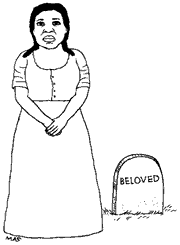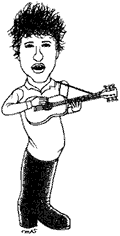
Movies
Beloved (Buena Vista Pictures). After weeks of buildup, critics are ambivalent about Oprah Winfrey's adaptation of Toni Morrison's novel: "[T]he movie is undeniably a labor of devotion and intelligence, but, in the end, a labor is just what it is" (Owen Gleiberman, Entertainment Weekly). The film gets a few outright raves, and Oprah's performance is universally lauded. "As for Winfrey, one can only say, My God, what a blaze of genius she is" (Stephen Hunter, the Washington Post). But critics praise the film's intentions more than the film itself. Other complaints: 1) At nearly three hours, the running time is too long. 2) The plot is hard to follow if you haven't read the book. 3) The film is too literal an interpretation of a book whose very essence is obliqueness and indirection. (Find out more about the film at the official site.)
Bride of Chucky (Universal Pictures). For the fourth sequel to a movie that wasn't great to begin with, this installment in the story of a demonic doll is getting surprisingly good reviews. Detractors are predictably disgusted: "[T]he novelty of a bloody horror film built around a malevolent doll carrying the soul of a serial killer has worn thin" (Lawrence van Gelder, the New York Times). But fans say the addition of Jennifer Tilly as Chucky's human girlfriend (who is later transformed into his doll-girlfriend) ratchets up the star power and the fun. They also praise the film's "flair," "wit," and willingness to make fun of itself (Leonard Klady, Daily Variety). (Visit "Chucky's Toybox," an unofficial fan site that has film clips, pictures, news, and a message board all about Chucky.)
Practical Magic (Warner Bros.). Muddled and pointless is how critics describe this girl-power witch movie. Despite two dazzling leading ladies (Nicole Kidman and Sandra Bullock), the film is said to be unsexy; and though a comedy about three sisters cursed with witchcraft who inadvertently kill their boyfriends, it is also said to be unfunny. Also annoying: the obligatory "Dancing Around Like Idiots" scene (Mick LaSalle, the San Francisco Chronicle) and "estrogen-soaked soundtrack" (Susan Wloszczyna, USA Today). A few indulgent critics call it a "guilty pleasure" that is "transcendentally silly" (Janet Maslin, the New York Times). (Visit the official site.)
Theater
Corpus Christi, by Terrence McNally (Manhattan Theater Club). After getting the best possible PR--an angry religious group demanding censorship and a slew of editorials citing the First Amendment--McNally's latter-day gay interpretation of the life of Jesus is universally panned. "Corpus Christi has all the power of a slap across the face with a limp lettuce leaf" (Jennifer Harper, the Washington Times). Contrary to expectations, the play is neither lascivious nor particularly blasphemous. It "positively exudes a puppy-like friendliness and eagerness to ingratiate" (Donald Lyons, the Wall Street Journal).(Learn more about the protests against the play; read Jacob Weisberg's review in Slate.)

Music
Live: 1966, by Bob Dylan (Columbia Records/Legacy). Critics wax poetic about the official release of the hitherto bootlegged "Royal Albert Hall" concert: "[S]tunningly good. The band creates waves of music that crash onto the shore and Dylan is almost giddy as he rides them in" (David Hinckley, New York Daily News). This pivotal concert bridges the gap between Dylan's beloved acoustic phase and his controversial electric phase, and the interplay between a defiant Dylan and the disapproving crowd is said to fuel the performance. (Slate's Jacob Weisberg finds the album "disappointing." Read his review/attack on the myth of bootlegs in general.)
Book
The Poisonwood Bible, by Barbara Kingsolver (HarperFlamingo). Kingsolver's latest is hailed as a step forward in maturity and scope. The story of a white missionary family in the Congo, the novel is praised for its attention to detail, female voices, and critical take on colonialism. A minority of reviewers find the political messages "heavy-handed" and say the novel is more like a "starklylit morality play" (Michiko Kakutani, the New York Times). (Listen to Kingsolver read an excerpt from this book.)
Recent "Summary Judgment" columns
Movie--Holy Man;
Movie--The Mighty;
Movie--Slam;
Movie--A Night at the Roxbury;
Dance--Swan Lake (Neil Simon Theatre, New York City);
Book--Work in Progress, by Michael Eisner with Tony Schwartz;
Book--Pure Drivel, by Steve Martin.
Movie--Antz;
Movie--What Dreams May Come;
Movie--Happiness;
Book--I Married a Communist, by Philip Roth;
Television--The Secret Diary of Desmond Pfeiffer;
Art--"Van Gogh's Van Goghs: Masterpieces From the Van Gogh Museum, Amsterdam."
Movie--Ronin;
Movie--Urban Legend;
Book--Two Cities, by John Edgar Wideman;
Opera--A Streetcar Named Desire;
Music--Painted From Memory, by Elvis Costello with Burt Bacharach;
Television--Felicity;
Art--"From Van Eyck to Bruegel: Early Netherlandish Painting in the Metropolitan Museum of Art."
Report--The Starr Report;
Book--Bag of Bones, by Stephen King;
Book--Model Behavior, by Jay McInerney;
Book--Birds of America, by Lorrie Moore;
Movie--Rush Hour;
Movie--Permanent Midnight;
Movie--A Soldier's Daughter Never Cries.
--Eliza Truitt